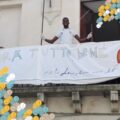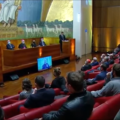
Workshop
“I was happy because I was alive”

By Michela Micocci- FARE SISTEMA OLTRE L’ACCOGLIENZA
In preparation for the next World Day of Migrants and Refugees we share a beautiful story of redemption, gratitude and trust from Italy’s southwest region of Calabria. Vanity Fair magazine presented the three main characters in this story as young Muslims grappling with the Body of Christ. When fraternity materializes within the warmth of a community, it is able to reach beyond every barrier.
The Co-op that will produce pasta and Communion wafers in the town of Rgliano, Italy is known as S.A.M. after the three young migrant boys, Sadia, Adama and Madi who began the business. All three left their homeland in Africa.

Salvatore Brullo from FO.CO., the leader of the project, which is supported by the Con Il Sud Foundation, explains the genesis of the idea: “There has been careful observation of the Province of Cosenza. It is a region that is devoted to the production of pasta; the culture of pasta-making really belongs to this area”.
The entire process was followed by Fare Sistema Oltre l’Accoglienza, thanks to the support of the Con Il Sud Foundation. The Co-op has been registered with the Chamber of Commerce.
The young entrepreneurs will produce dried pasta using exclusively fine grains for large-scale sale and distribution. Whoever buys S.A.M. Co-op pasta is not only buying a food product but contributing to a project of inclusion which allows migrant children to become active members of the community that welcomes them: “They are no longer assisted by the state, but taxpayers”.
There is also another very important aspect of this start-up project. Along with pasta, the boys will also produce Communion wafers. It was not a random choice, but one based on economic and more sublime reasons. Salvatore Brullo explains: “Hosts are an attractive market. There is a lot of competition, but also a great demand. Therefore, the integrational aspect coupled with such a powerful symbol of the Christian religion is very strong”.
There are three real life stories behind the S.A.M. Co-op, the immigration stories of Sadia, Adama and Madi who arrived in Italy as minors in 2017.
MADI
Madi lives at Ishmael House in Rodigliano. He is 20 years old and has very clear plans. Madi’s mother is a retired doctor and, his father, a farmer. It is not for economic reasons that he left the Ivory Coast: “I was studying. I had finished high school and I wanted to enroll in the School of Economics. It was a personal choice, one of freedom and independence.”
Following his independent nature, Madi left the Ivorian capital four years ago and, together with some friends, embarked on a journey to Libya. Four months after leaving the Ivory Coast, he landed in Catania, Sicily. He was a minor and was therefore welcomed into the structures for unaccompanied foreign minors. In the summer of 2020, just after the first pandemic lockdown had ended, he was offered the opportunity to attend a course for workers in the production of fresh artisan pasta. He liked the idea and moved to the Italian Province of Cosenza. In May 2021 another proposal came which, once again, reinforced his feeling that he had made the right decision in coming to Italy and becoming a working member of the Co-op: “I hope it allows us to integrate more. To become self-supporting, to grow the business. Maybe over time we can even hire other people to work with us. It would be nice!” And what do you think of the fact that baking Communion wafers was also part of the plan? “It’s something more which allows us to expand our production”.
SADIA
It was the month of June four years ago when Sadia landed in Italy. A minor, just 17 years old, he had left Senegal behind and spent about twelve months in Libyan prisons. He got out and got to work raising the money to pay for crossing of the Mediterranean. What drove him was the desire to make a better life for himself: “I said to myself that I was going to change my life and the life of my sister.” After paying the smugglers, he and some of his friends went to the appointed place on the beach for the night-time departure. The boat started sailing. But after just one kilometer they had to go back to Libya. Not a single light worked on the hull, and it was impossible to go to sea. Twenty-four hours later they tried again, setting sail at midnight. At seven in the morning, they were facing the Calabrian coast. They were put on a ship that had come to rescue them. Sadia, who was then a minor, was transferred to the Ishmael House shelter for minors in Rogliano. There were about fifteen boys with him. This is where he became a legal adult. When he had just turned 18 in 2019, he was first welcomed into the Strade di Casa (SPRAR) in Rovito, Italy. Then, in October 2019, he was included in the Enlarge the Space in Our Tent Project from the Office for Migrants in the Archdiocese of Cosenza, which was financed by the CEI the Enlarge the space in our tent, financed by the CEI’s Free To Leave, Free To Stay Campaign. The project supports young people with housing and training and accompanies them in finding a job. The fresh pasta production operator course that Sadia attended in the summer of 2020 was part of that. But it was only one piece in a much larger mosaic because, in the meantime, the 21-year-old Senegalese made some other important strides. He graduated from the eighth grade, worked at two jobs (in a printing business and in a pasta factory) and worked as an assistant cook. Now he lives in an apartment with some friends.
ADAMA
“In order to have a future you must first have a present, and the present can only be work,” says 21-year-old Adama, who is one of the three S.A.M. workers.
Adama was born on March 13, 2000, and up until four years ago, he lived in the city of Tambacounda, in the eastern part of Senegal where he studied and worked in the countryside: “I didn’t plan on coming to Italy. I didn’t think about it. I set out on the road for no particular reason and stayed in Algeria for eight months because I found a job in a factory.” But then the friends with whom he had left Senegal decide to get back on the road and he, in order not to be alone, followed them until they crossed the border of Libya. Fortunately, Adama never experienced the terrible Libyan prison as many migrants have before leaving Africa. However, like everyone else, Adama also had to pay to get on a boat that would take him across the Mediterranean. The boat was not large and there were about 150 children on board. At three in the morning navigation began. It was summer and the sea was calm. As it became day, huddled together with no water to drink and the sun blazing, the heat and thirst became unbearable: “I didn’t know it was so difficult. I thought that with an hour or two of travel we would already be in Italy”.
For a week, after their landing, Adama was welcomed into a temporary structure set up in a volleyball court, but “I was happy because I was alive, not everyone manages to arrive alive.” Then, together with the other minors, he was transferred to Rogliano, to the SPRAR’s Ishmael House. He studied and learned to speak Italian. Having come of age, Adama, like Sadia, continued his road to independence in the SPRAR for adults in the Rovito Strade di Casa. Then, in October of the same year, he joined the Enlarge the Space of Our Tent Project deom the Migrants Office at the Archdiocese of Cosenza. Thanks to that project he was assisted in taking some more important steps, such as renting an apartment in Cosenza, managing bills, and buying groceries, which he was not used to doing. He worked shifts at the kitchen, preparing lunch and supper. In short, he was becoming independent. Do you think the Co-op will be well received, could there be problems with racism? “I don’t know. I keep going. Racism exists all over the world, but I’ve never had any problems”.






